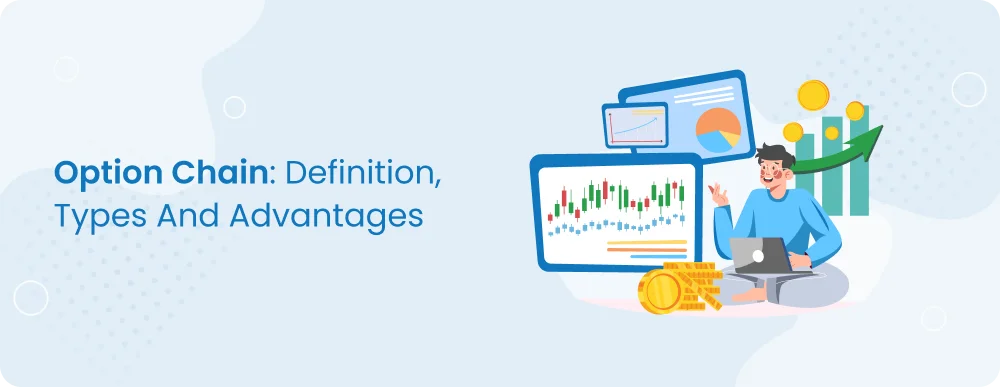Option Chain: Definition, Types, and Advantages
Noor Kaur
8 Oct 2024Tags:
Featured
Key Takeaways
An Option Chain lists all call and put contracts for a stock or index in one place.
It helps traders analyse strike prices, premiums, open interest, and volume.
Understanding and analysing option chains provides insights into market sentiment.
Using option chains wisely can improve trading strategies and risk management.
Option chain trading is an excellent way to invest in any asset. They provide compressed information that helps you analyse the market and make wise choices. This makes it accessible, reliable, and beginner-friendly. Almost all big exchanges have option chains listed and are available for the public to view.
If you do not know an option chain, learn about it before investing. Read this article till the end; it will help you understand option chains in detail and how they can be useful.
What is an Option Chain?
An option chain is a table listing all available contract options for an asset. It also provides in-depth information about the contract, such as strike prices, premiums, and volumes.
Option chain data provides an overview of the contracts available for an asset, helping traders make informed decisions.
Traders use the option chain to search for possible trading opportunities, manage risks, and assess market sentiment.
Understanding the Structure of an Option Chain
The options chart has many components that help the traders understand the qualities of any asset in more detail. These contents are:
- Underlying asset: The asset on which an option contract is based.
- Strike Price: The fixed price at which an option can be bought or sold.
- Expiration Date: The date on which the contract expires.
- Premium: This is the price paid to purchase an asset.
- Open Interest: The number of contracts that are currently listed in options trading for one asset.
- Volume: The total number of contracts that have been traded in a particular period.
- Bid and Ask Price: the highest price a buyer is willing to pay and the lowest price a seller is willing to sell an asset for.
For Example:
The option chain for an asset may look like this:
Different Types of Option Chains
There are various types of option chains to trade in. Some of them are:
Standard Option Chains
These chains are used to list options with a pre-decided expiration cycle that is announced in advance(for example, monthly or quarterly). The strike prices for this option chain are spread evenly, and the options can be bought or sold on any business day during the expiration period.
Weekly Option Chains
These options expire weekly, mostly on Fridays. They offer greater flexibility for short-term traders and reduce time decay. They have the potential for higher returns but also come with significant risks.
Combination Option Chains
These option chains involve multiple options with different strike prices and expiration dates. They can mostly be straddles (buying a call and a put with the same strike price and expiration), strangles (buying a call and a put with different strike prices and the same expiration) or spreads (combining a variety of call and puts with different strike prices and expiration).
Exotic Option Chains
These option chains offer a wide range of pay-off structures, which allow traders to create personalised option trading strategies based on their needs. Unlike traditional ones, exotic options have flexible expiration dates. They can be based on various underlying assets such as baskets of securities, currencies, commodities, etc. Some examples are Asian options, Barrier Options, Lookback options, etc.
Suggested Read:What are the Types of Options Trading?
How to Read and Analyse an Option Chain?
An effective option chain analysis is a very important part of trading. Some ways you can read and analyse option chain data are:
- Understand the asset and recognise the expiration date to see if it aligns with your investment goal.
- Carefully analyse the strike prices for the asset and then pick the most profitable one.
- Compare premiums to select the most cost-effective one.
- High open interest and volume generally indicate more liquidity, which is very beneficial in trading,
- If the implied volatility is higher, it means that the market prices for that particular asset are expected to fluctuate.
- It is important to Analyse Delta, which measures the option’s sensitivity to change. Even a minute change means a price shift in the asset cost.
Key Benefits of Using an Option Chain
An option chain can be beneficial in many ways. Here are some benefits of an option chain:
Comprehensive Market Overview
An option chain provides a single, collective profile of all the available call and put options for a specific underlying asset. This allows traders to easily compare prices, implied volatilities and open interest across different strike prices and expiration dates.
Risk Management
Options allow traders to hedge their positions against expected price fluctuations. They also help limit losses in particularly volatile markets. Investors can personalise risk exposure by choosing different strike prices and expiration dates.
Suggested Read: Risk Management in Trading: Stop Losses and Position Sizing Explained
Profit Potential
These chains have a large profit margin as they offer traders leverage. This helps them control a large position with smaller investments. The chains also have a time value aspect that decreases over time. Traders who believe that the underlying asset’s price will remain stable use this to their benefit.
Flexibility
An option chain as an investment provides flexibility to an investor. They can customise their option positions based on their needs and capacity, as well as a number of strategies that help them gain maximum profit. Option chains also offer multiple entry and exit points that help them capitalise on trading opportunities.
Conclusion
Options trading is a very useful way to invest. It has many benefits and a variety of options to choose from. Though, it is not risk-free and does not guarantee any profits. Traders are always advised to consult experts and make informed decisions after analysing all the options.
FAQs
Q1. What are the 3 types of options?
The three types of option are:
- Call option
- Put Option
- Binary Option
Q2. Which option chain is the best?
There is no one perfect option chain. Each chain depends on the trader's needs and strategy.
Q3. How many option chains are there?
There are many option chains. The number differs according to where these chains are traded.
Noor Kaur
8 Oct 2024Related blogs
Sign up to our newsletter !
Share this article on
Recent articles
Tags:
Open a Demat Account in just 15 minutes !

Click on open
account below

Fill out some
basic details

Upload your
documents

Start trading in
24 Hours *
Commonly asked questions
Is Master Capital Services Limited SEBI registered?
Do you have a mobile app for Trading and Finance Management?
What services does mastertrust provide?
What is the minimum investment required to start trading with your company?
Is my personal and financial information secure with your company?
What is your customer support availability?





